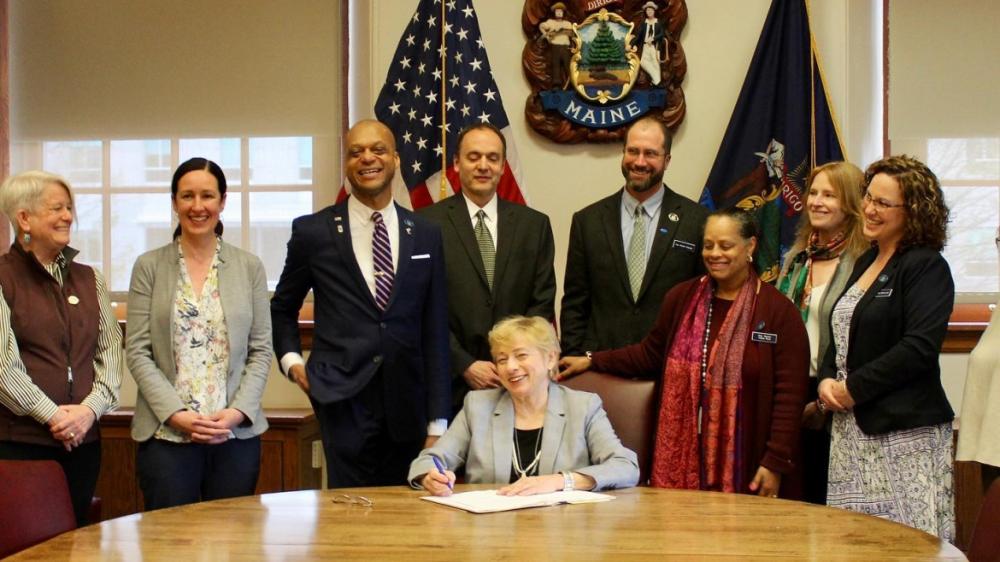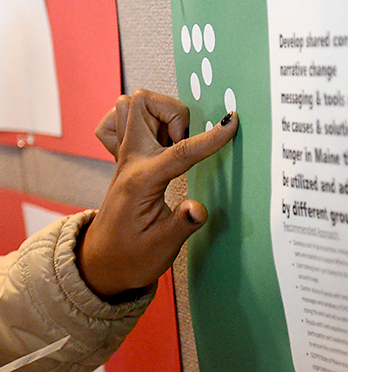
The mission of the Governor’s Office of Policy Innovation and the Future (GOPIF) is to foster collaboration across state government to help solve Maine’s most important long-term challenges utilizing data-driven, innovative policy solutions.
Now home to the Ending Hunger in Maine initiative, GOPIF serves as a convener, bringing stakeholders together across and beyond state government to create a Maine free from hunger with Maine’s Roadmap to End Hunger as its guide. This work is facilitated by GOPIF’s Anti-Hunger Policy Coordinator, including:
- Facilitating coordination of key policy initiatives and recommendations outlined in Maine’s Roadmap to End Hunger by 2030.
- Spearheading collaboration and coordination of anti-hunger and anti-poverty strategies and policies across state agencies and with external stakeholders.
- Convening the statewide Ending Hunger Advisory Committee charged with guiding the implementation of Maine’s Roadmap.
- Tracking data to inform anti-hunger strategies, measure progress, and monitoring the impact of key anti-hunger policies and programs.
Everyone at the Table: Maine’s Roadmap to End Hunger by 2030
We envision a Maine free from hunger. That is a Maine where everyone has the economic resources to secure consistent, easy access to enough healthy, culturally appropriate food for an active and healthy life.
Maine’s Roadmap to End Hunger by 2030 proposes two overlapping strategy areas—strengthening our response to food insecurity today and preventing food insecurity tomorrow by addressing the root causes of hunger and food insecurity in our state. The plan has five interconnected goals to advance this dual approach:
- Capacity Building: Build the infrastructure and capacity to coordinate the implementation of Maine’s Roadmap to End Hunger.
- Food Access: Ensure consistent, easy, and equitable access to healthy and culturally appropriate food.
- Economic Security and Opportunity: Promote, bolster, and ensure economic security and opportunity.
- Narrative Change: Change the narrative of food insecurity to focus on collective responsibility and amplify the voices of impacted people.
- Equity: Close the equity gap in household food security by addressing underlying structural inequities in all Ending Hunger 2030 goals.
Priorities for Aligned Action 2025-2027
 In 2024, five working groups were formed, based on the five goals of the Roadmap, to identify areas of focus for implementation in the short-term, while maintaining the plan’s core theory of change.
In 2024, five working groups were formed, based on the five goals of the Roadmap, to identify areas of focus for implementation in the short-term, while maintaining the plan’s core theory of change.
The resulting Priority Areas for Aligned Action 2025-2027 represent shared goals for aligned action across sectors, leveraging the unique strengths of individual partners in the Ending Hunger in Maine network and the impact that can only come from collaboration:
- 1) Maximize Federal Nutrition Programs & Improve Access to Public Benefit Programs through Cross-Sector Collaboration, Administrative Streamlining, and Outreach & Application Assistance
-
- Streamline administration and improve access to public benefit programs to make it easier to apply for, maintain, and use public benefits.
- Include people accessing the public benefits system or impacted by poverty in efforts to identify barriers and solutions to benefits access to ensure programs gain from the expertise of lived experience and meet community needs.
- Expand outreach & application assistance to populations that face barriers to federal nutrition programs & public benefit programs.
- Expand access & building capacity of out-of-school time Child Nutrition programs (SUN Meals & SUN Meals To-Go and the Child and Adult Care Food Program, CACFP), WIC, and Older Americans Act Nutrition programs.
- 2) Invest in the Leadership & Inclusion of Impacted People in Ending Hunger in Maine Efforts
-
- Ending Hunger in Maine Initiative:
- Ensure that funding is available to compensate people with lived experience for their participation and expertise on the Ending Hunger in Maine Advisory Committee.
- Partner with community-based organizations that provide leadership and advocacy training and support to people with low-income and lived experience of food insecurity and poverty, to support engagement on the EHM Advisory Committee.
- Provide support with fundraising, coordination of efforts, and highlight the impact and importance of existing on-the-ground, community-based efforts to empower and invest in the leadership and inclusion of impacted people.
- Benefits Access [see 1B]: To be implemented, in part, through the Ending Hunger in Maine Advisory Committee’s engagement with the State Cross-Agency Staff Group.
-
Narrative Change [see 3A]
- Food Assistance [see 4A]
- Ending Hunger in Maine Initiative:
- 3) Develop Shared Ending Hunger Narrative Change Messaging
-
- Develop Core Narrative Change Messaging and Tools About the Causes and Solutions to Hunger in Maine That Can Be Utilized and Adapted by Different Groups. Build on the work of Davey Strategies for Ending Hunger Maine, narrative efforts of partner organizations, and the key elements developed by the Narrative Change Work Group, including:
- Strength-based, unifying narrative.
- Emphasizing hunger as a systemic issue, not one caused by individual failings.
- Center voices of people with lived experience in developing Ending Hunger in Maine narratives.
- Develop Core Narrative Change Messaging and Tools About the Causes and Solutions to Hunger in Maine That Can Be Utilized and Adapted by Different Groups. Build on the work of Davey Strategies for Ending Hunger Maine, narrative efforts of partner organizations, and the key elements developed by the Narrative Change Work Group, including:
- 4) Expand Accessibility and Impact of Food Assistance Programs
-
- Improve access for disproportionately impacted communities who are underserved by charitable and public food assistance programs.
- Build, expand, and strengthen relationships with individuals, organizations and community groups that are embedded in impacted communities. Emphasize relationships that will improve access.
- Develop better data sharing models to measure the extent to which programs are meeting the needs of all populations.
- Integrate complementary services and supports with food assistance programs (e.g. connections to public assistance programs) and co-locate food access points at locations providing other community and public services.
- Continue to invest financially in charitable and community-based food assistance programs to bolster capacity to provide high value, barrier-free, and culturally responsive access to food and ensure the system can meet the need.
- Improve access for disproportionately impacted communities who are underserved by charitable and public food assistance programs.
- 5) Leverage Local Food & Nutrition Incentive and Intervention Programs that Increase Low-Income Purchasing Power, Increase Agency and Choice, and/or Increase Access to Nutritious, Local, or Culturally Important Foods.
-
- Maximize programs, policies, and funding streams which increase low-income purchasing power, agency and choice, and/or access to nutritious, local, or culturally important foods. For example, these may include local food for food assistance programs, farm to institution/school, food recovery efforts, nutrition incentive programs (e.g., Maine Harvest Bucks), and Food is Medicine initiatives.
- Support efforts to develop a Maine Food Plan (as recommended in the Maine Climate Plan update) and coordinate alignment with Maine’s Roadmap to End Hunger by 2030.
-
Emphasize investment in socially disadvantaged producers.
-
Emphasize the intersection of increasing low-income food access and strengthening Maine’s local food system.
-
- 6) Support Efforts to Reduce Transportation Barriers & Housing Instability, Emphasizing the Impact on Food Insecurity.
-
- Support Efforts to Reduce Transportation Barriers to Food, Resources, Jobs, and Opportunity
- Support Efforts to Reduce Housing Instability
- Connect to Narrative Change Messaging: Emphasize the interconnection of transportation access, housing stability, and food security.
For more information about Governor Mills’ Ending Hunger in Maine initiative, please contact Tobey Solomon-Auger, Anti-Hunger Policy Coordinator, at tobey.solomon-auger@maine.gov
History of Maine's Ending Hunger in Maine Initiative
In 2019, citing the significant social and economic threats that household food insecurity poses to Maine today and to Maine’s future tomorrow, the State of Maine made a historic commitment to act with the passage of LD 1159 Resolve to End Hunger by 2030. This bi-partisan legislation, authored by then-Rep. Craig Hickman and signed by Governor Mills, directed the Maine Department of Agriculture, Conservation & Forestry to coordinate a cross-sector effort to develop a strategic plan to achieve this bold goal.
Over two-hundred Mainers were engaged across a two-year, multi-phase process to inform the final product, beginning with the development of the Interim Report, delivered to Maine’s 129th Legislature in 2020, followed by the Impacted Community Recommendations & Review on the Interim Report on Ending Hunger in Maine by 2030, submitted to the Maine Department of Agriculture, Conservation & Forestry in 2021. The result is Everyone at the Table: Maine's Roadmap to End Hunger 2030, a plan which is rooted in evidence-based solutions to hunger, the unique nature of the problem in Maine, and the priorities of Maine people.
Maine’s Roadmap was greatly improved by Mainers who contributed lived expertise of poverty and hunger – a process, which was difficult and, at times, trauma-inducing. The State of Maine is grateful to Resources for Organizing & Social Change (ROSC) for their leadership coordinating and elevating these voices and for the resulting Impacted Community Report and dynamic Roadmap.
In 2022, Maine’s 130th State Legislature endorsed the recommendations of the strategic plan, with the passage of LD 174 An Act to Implement Maine’s Roadmap to End Hunger. That legislation directed the Governor’s Office of Policy Innovation and the Future (GOPIF) to provide staffing and coordinate implementation of Maine’s Roadmap with guidance from an advisory committee composed of members with lived expertise and content expertise relevant to the goals and strategies included in the plan.